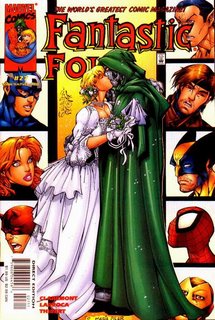The similarity, at least in spirit, of this fight scene to DC's Silver Age tales could be intentional on the part of the creative team. The Squadron Supreme/Sinister is an homage to all the classic DC characters of the JLA, created in Marvel titles back when cross-overs and cooperation between Marvel and DC were unthinkable (Much like the business environment of today. Thanks, Joe!).
The old Avengers vs. Squadron stories were good nudge-nudge-wink-winks for the fans (like me) who desperately wanted to see a story that featured the Avengers and the JLA but would have had to wait a few decades for it to actually happen in reality.
 This attack on the reproductive organs made me wince a bit to read it. The Radioactive Man determines what frequency of radiation would render Hyperion powerless and gives him a good zap, removing the Squadron's strongest member from the field. One might think that Bats-homage character the Nighthawk is the member to be feared above the magicians and muscle-heads, the one to watch. Like his counterpart the Batman, the Nighthawk should be a force to be reckoned with in a fight due to his brilliant pre-planning. One couldn't be more wrong. In this story Nighthawk is a dead-on copy of the Darknight Detective, as he is taking a page from the Batman Crime Stoppers' Textbook by just hanging back and observing from a safe distance, waiting for the danger to pass.
This attack on the reproductive organs made me wince a bit to read it. The Radioactive Man determines what frequency of radiation would render Hyperion powerless and gives him a good zap, removing the Squadron's strongest member from the field. One might think that Bats-homage character the Nighthawk is the member to be feared above the magicians and muscle-heads, the one to watch. Like his counterpart the Batman, the Nighthawk should be a force to be reckoned with in a fight due to his brilliant pre-planning. One couldn't be more wrong. In this story Nighthawk is a dead-on copy of the Darknight Detective, as he is taking a page from the Batman Crime Stoppers' Textbook by just hanging back and observing from a safe distance, waiting for the danger to pass.What caused a cringe from me was that the Radioactive Man didn't just zap Hyperion. No, that was not good enough. Instead of just pointing and shooting the RM grabs a big handful of Hyper-Package and gives Skippy the whipping to end all whippings. This date did not have a happy ending.











